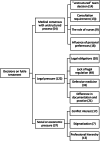Medical futility at the end of life: the first qualitative study of ethical decision-making methods among Turkish doctors
- PMID: 39482685
- PMCID: PMC11529328
- DOI: 10.1186/s12910-024-01120-1
Medical futility at the end of life: the first qualitative study of ethical decision-making methods among Turkish doctors
Abstract
Background: The swift advancement of intensive care medicine, coupled with technological possibilities, has prompted numerous ethical inquiries regarding decision-making processes concerning the withholding or withdrawal of treatment due to medical futility. This study seeks to delineate the decision-making approaches employed by intensive care physicians in Türkiye when faced with medical futility at the end of life, along with an ethical evaluation of these practices.
Methods: Grounded theory, a qualitative analysis method was employed, conducting semi-structured, in-depth interviews with eleven intensive care physicians in Türkiye. The subsequent text analysis was carried out using MAXQDA software.
Results: Participants assert that the decisions made by Turkish physicians determine whether treatment is futile, rely on medical consensus, and lack a standardized decision-making process. The decisions are influenced by legal and social pressures, resource constraints, and occasional conflicts of interest. The significance of professional hierarchy is notable, with limited consideration given to the opinions of nurses and other staff. The unstructured medical consensus processes are shaped by normative concepts such as benefit, age, justice, and conscience. Furthermore, it was observed that the conscientious opinions of physicians carry more weight than adherence to ethical principles and guidelines.
Conclusion: To create optimal conditions for doctors to make ethically justifiable decisions, the dynamics within the treatment team should be improved, emphasizing the minimization of hierarchy, and ensuring the active participation of all team members in the decision-making process. Additionally, efforts should be directed toward narrowing the gap between the conscience of the individual doctor and established ethical principles. A potential solution lies in the nationwide implementation of clinical ethics committees and the establishing of clinical ethics guidelines, aiming to address, and overcome the identified challenges.
Keywords: Conscience; Culture; End-of-life decisions; Grounded theory; Intensive care ethics; Medical futility.
© 2024. The Author(s).
Conflict of interest statement
The authors declare no competing interests.
Figures



References
-
- Schneiderman L, Jecker N, Jonsen A. Medical futility: its meaning and ethical implications. 1990. Available from: https://www.semanticscholar.org/paper/4def673f955fb5c4a99501f2fa85d254d0.... - PubMed
MeSH terms
LinkOut - more resources
Full Text Sources
Miscellaneous

